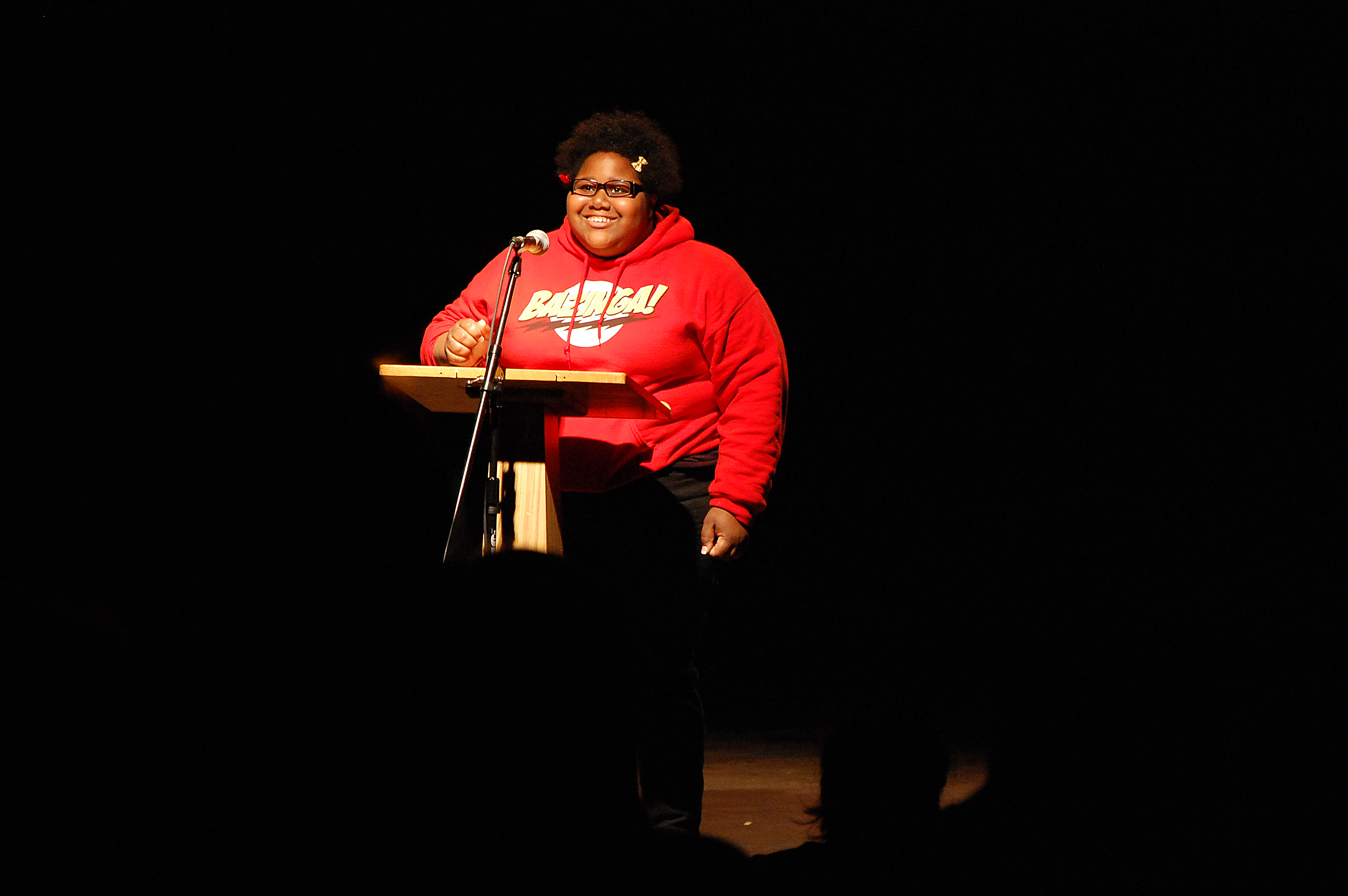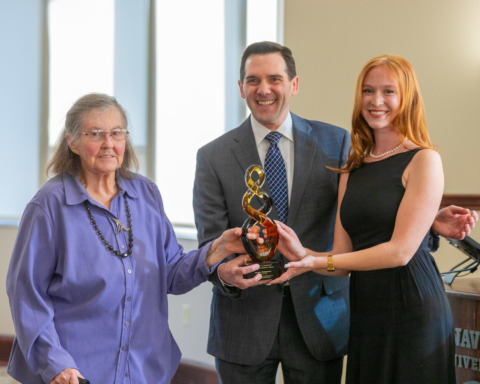By Matthew Laurrie
Assistant Features Editor
With the lights dimmed, anxious audience members gazed toward the stage. A spotlight centered and the Garret Theater came alive with poetry at the commencement of St. Bonaventure’s fourth poetry slam.
The Slam Poetry Club recently adopted “There is no excuse for art” as its catchphrase. It embodies the idea every piece of literature is worth reading, writing, performing and believing in, at least according to the poets at Wednesday’s slam poetry competition.
Three judges evaluated the 12 poets’ presentations based on content and performance. The top six poets moved on to the second round where they presented another original poem before the top three poets were announced.
James Riley, Makeda Loney and Kevin Cooley each placed in the competition, with Riley taking home the highest honor.
Despite winning, Riley, a senior music major, said he was surprised at the outcome.
“I thought Makeda deserved the first place prize. Her poetry left her vulnerable, and that was how you knew it was real, and it was raw and it was genuine,” Riley wrote in an email. “All the poets were great tonight, and I thought it was really dope how there were so many first-time Bonaventure slammers competing. The whole event was a success.”
Andrea Westerlund, a graduate student in the English department and emcee of the event, summed up the essence of slam poetry.
“If hip-hop and poetry had an illegitimate baby, it would be slam poetry,” she said.
Westerlund explained slam poetry is much more than words on a page.
“Some poems are meant to be read on a page, and slam poetry is meant to be heard by an audience, so there’s a rhythm aspect, there’s a performance aspect, there’s the connection with the audience,” said Westerlund, president of the Slam Poetry Club. “It’s different than just a poetry reading.”
Steven Kuzara, a junior English major who advanced to the second round of the competition, said despite partaking in the slam competitions since his freshman year, he always learns something new about people when they perform.
“I just like seeing different voices of all the performers,” Kuzara said. “When they’re reading a poem, I always see a new side of them, and it’s really cool. Even though it’s my third year doing this, I still learn new things. I’ve learned how to play with words and word sounds – it is more important than I thought it was.”
The Slam Poetry Club held the event in conjunction with the English and theater departments. The slam, which drew more than 50 audience members, highlighted the intensity that accompanies the poetic voices of students on campus.
Prior to the competition, Loney, a sophomore journalism and mass communication major, flipped through the pages of her poetry “bible,” where she jots down her ideas. She reflected on her evolution as a poet and how sharing her poems with others impacts her style. Little did she know, she would score second place in the contest.
“Poetry is what I live for, and being able to share that with other people is just amazing,” she said before performing. “I’ve always been an outgoing person, but now through poetry and other art forms I’ve been more open.”
Lauren Caputi, a junior English and journalism and mass communication major, said the creative license one obtains when writing poetry is powerful. She also said writing can be a tremendous outlet for people to discover their potential.
“Anyone can write poetry, but at the same time it’s amazing how poetry from certain people can just move you in such a way,” Caputi said. “If you find your niche, if you find what you really enjoy talking about, it’s amazing what can happen.”
Caputi said her involvement in the slam competitions has empowered her to speak her mind and communicate her thoughts poignantly and effectively.
“It feels good to know that no matter what you have written, there’s always people that are going to listen to you, and you have those two minutes to say whatever you want,” she said.
Alex Henry, a junior gerontology major, said the poetry slams are an artistic way for her to become more comfortable with herself and others, because she typically gets nervous before performances.
“One thing I like about (the competition) is that … I get out of my comfort zone,” Henry said. “I want to get out of (my) shyness (and) nervousness. It’s fun using my poetry to actually help me through.”
Readers and audience members must read between the lines of poetry because each piece is uniquely tailored to express emotion and feeling, and, ultimately, tell a story, according to Henry.
“Every time somebody writes a poem, there’s a story behind it,” she said.
Each slammer used inspirations — ranging from his or her family and friends, God, nature or personal experiences — to demonstrate his or her passion for writing.
Westerlund identified poetry as open-ended and imaginative. Everything someone writes down is a valuable piece of art.
“There’s no such thing as a bad poet, and there’s absolutely no definition of a poet because there are so many different people and so many different things that come up on stage,” Westerlund said. “If you own it, and if you felt like it was worth writing down, then it’s poetry and it’s worth reading out loud to people.”
laurrimr11@bonaventure.edu






